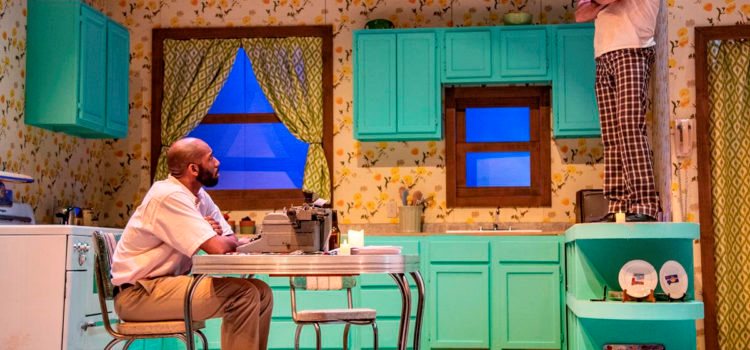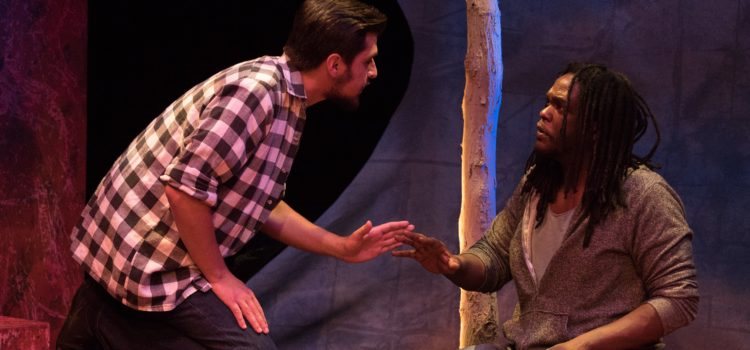By Lynn Venhaus Managing Editor Menace is in the air as a tempestuous sibling rivalry escalates in the late great Sam Shepard’s muscular masculine opus, “True West.”
Clearly, their mother did not heed music outlaws Waylon Jennings and Willie Nelson’s warning: “Mammas, don’t let your babies grow up to be cowboys.” The two grown-up brothers can’t be fenced in, especially gonzo Lee, and now it appears unlikely that Austin will ride off into the sunset, despite once playing by the rules.
In the intimate space of the Gaslight Theatre, we’re in for
a splendid guns a-blazing exploration of the after-effects of growing up with a
raging alcoholic dad, with dutiful sons sparing over birthrights, and a splash
of the showbiz industry dreams machinery in California.
The impressive St. Louis Actors’ Studio production allows Shepard’s unconventional
genius to shine and vividly brings out the dark absurdist humor. The
centerpiece is Isaiah Di Lorenzo’s brilliant, blistering performance as Lee, a
swaggering beer-swilling slob.
In keeping with STLAS’ season theme, “Blood is Thicker Than
Water,” director William Whitaker heightens the bravado and tightens the
tension, all the better for the outrageous, twisty surprises.
As the black-sheep oddball Lee, Di Lorenzo sets the tone when he shows up at his mother’s neat suburban home where his writer brother is housesitting. William Humphrey establishes their differences quickly as the tall and tidy Austin. In body language and inflection, both men tell you all you need to know about who they are and their adversarial relationship. One can surmise this isn’t their first rodeo — the brothers have agitated and needled each other their entire lives. Lee circles, like an animal, trying to mark his territory for dominance. Those animal characteristics will become more prominent in the brothers’ face-off.
In the suburban silence of their mother’s kitchen, 40 miles outside Los Angeles, Ivy League graduate Austin attempts to work on his screenplay because he has a development deal with a hot-shot Hollywood producer. His wife and child did not accompany him. Disheveled Lee hasn’t seen him in five years because he’s been living in the desert. Does he want to stir up trouble? After all, he is a cunning thief and loves drama.
William Humphrey, William Roth in “True West.” Photo by Patrick Huber. Producer Saul Kimmel arrives for a meeting, and William Roth embodies those smarmy back-slapping, old-school wheeler-dealers. In an improbable move, he likes Lee’s pitch for a modern western better than Austin’s period-piece love story, and switches allegiance midstream. Whoa! The news turns their worlds upside down. Austin is angry that his ne’er-do-well brother has co-opted his dream. Tables are turned and the gauntlet is thrown. Soon, the brothers are making a pigsty of their mother’s home, destroying any decorum or convention. When Austin steals toasters, toast will be made and offered, a meaningful gesture. Real working toasters are plugged in on the set. Bravo.
As the brothers’ resort to their animal instincts, it’s
certainly not pretty when Mom arrives home from her Alaska trip. She can’t deal
with her trashed house and soon flees. Hmmm…
The unrepentant alcoholic dad lives in the desert. The kids have issues because of the family alcoholism and dysfunction, of course. But mom (Susan Kopp) is ineffectual and somewhat ditzy. Because Shepard’s career was shaped by his alcoholic upbringing, it also frames this work, for there are no happy trails.
Di Lorenzo and Humphrey display all the resentment,
jealousy and one-upmanship that the play calls for, carefully crafting their
individual behaviors. They’re well-rehearsed at getting under the skin of the
other one.
Shepard wrote “True West” in 1980, when he was a resident
playwright in San Francisco. It was the third in a troubled family tragedy
trilogy, preceded by “Curse of the Starving Class” and “Buried Child.”
While he would go on to a lengthy acclaimed career as both a playwright and an Oscar-nominated actor, Shepard obviously had experience with the whims and phoniness of the screen trade, which he also skewers with glee.
This bold and brisk story has been malleable enough to be
relevant in multiple decades, maintaining its bite nearly 40 years later.
The play gained notoriety in 1982 when then-unknown actors
John Malkovich and Gary Sinise moved their Steppenwolf Theatre Company
production to off-Broadway and it was named a finalist for the Pulitzer Prize
for Drama in 1983. An acclaimed revival on Broadway in 2000 starred John C.
Reilly and Philip Seymour Hoffman, and recently, a limited engagement starred
Ethan Hawke and Paul Dano.
The savagery is real and intense, and scenic designer Patrick
Huber’s well-appointed set is a marvelous playground for the family sparring.
Whitaker has secured a safe space for DiLorenzo to create a
rhythm for the off-the-wall loose cannon, and he is mesmerizing. Humphrey is
steady, on guard for Lee’s ability to suck all the air out of the room. You
feel his frustration.
The unpredictability of Lee is what keeps the audience
engaged. But nobody is safe. Could they be parts of the same person?
Lighting design by Steve Miller accentuates the sunny days
while the outstanding sound design by Whitaker and Jeff Roberts provides the
cacophony of crickets and howls of coyotes.
One of the show’s aural treats is the use of old-timey
country-and-western music to lead in and out of scenes.
This dynamic, rugged production has true grit and an affection for the dueling
brothers, but never gives in to predictability, excelling in its edginess.
St.
Louis Actors’ Studio presents Sam Shepard’s “True West” April 12 to 28 at The
Gaslight Theatre in the Central West End, 358 N. Boyle Ave. Performances are
Thursday through Saturday at 8 p.m. and Sunday at 3 p.m. For tickets or more
information, visit www.stlas.org. Phone is 314-458.2978. The West End
Grill and Pub is now open for dinner, snacks and drinks.

Lynn (Zipfel) Venhaus has had a continuous byline in St. Louis metro region publications since 1978. She writes features and news for Belleville News-Democrat and contributes to St. Louis magazine and other publications.
She is a Rotten Tomatoes-approved film critic, currently reviews films for Webster-Kirkwood Times and KTRS Radio, covers entertainment for PopLifeSTL.com and co-hosts podcast PopLifeSTL.com…Presents.
She is a member of Critics Choice Association, where she serves on the women’s and marketing committees; Alliance of Women Film Journalists; and on the board of the St. Louis Film Critics Association. She is a founding and board member of the St. Louis Theater Circle.
She is retired from teaching journalism/media as an adjunct college instructor.


